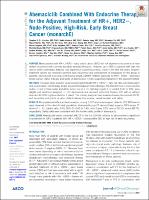| dc.contributor | Vall d'Hebron Barcelona Hospital Campus |
| dc.contributor.author | Johnston, Stephen RD |
| dc.contributor.author | Harbeck, Nadia |
| dc.contributor.author | Hegg, Roberto |
| dc.contributor.author | Toi, Masakazu |
| dc.contributor.author | Martin, Miguel |
| dc.contributor.author | Shao, Zhi Min |
| dc.contributor.author | Cortés Castan, Javier |
| dc.date.accessioned | 2021-09-13T08:40:21Z |
| dc.date.available | 2021-09-13T08:40:21Z |
| dc.date.issued | 2020-12-01 |
| dc.identifier.citation | Johnston SRD, Harbeck N, Hegg R, Toi M, Martin M, Shao ZM, et al. Abemaciclib Combined With Endocrine Therapy for the Adjuvant Treatment of HR+, HER2−, Node-Positive, High-Risk, Early Breast Cancer (monarchE). J Clin Oncol. 2020 Dec 1;38(34):3987–98. |
| dc.identifier.issn | 1527-7755 |
| dc.identifier.uri | https://hdl.handle.net/11351/6305 |
| dc.description | Càncer de mama precoç; Teràpia endocrina; Abemaciclib |
| dc.description.sponsorship | Funded and sponsored by Eli Lilly and Company. Additional support provided by National Institute for Health Research funding to the Royal Marsden and Institute of Cancer Research Biomedical Research Center. |
| dc.language.iso | eng |
| dc.publisher | American Society of Clinical Oncology |
| dc.relation.ispartofseries | Journal of Clinical Oncology;38(34) |
| dc.rights | Attribution-NonCommercial-NoDerivatives 4.0 International |
| dc.rights.uri | http://creativecommons.org/licenses/by-nc-nd/4.0/ |
| dc.source | Scientia |
| dc.subject | Mama - Càncer |
| dc.subject | Medicaments antineoplàstics - Ús terapèutic |
| dc.subject.mesh | Breast Neoplasms |
| dc.subject.mesh | Neoadjuvant Therapy |
| dc.subject.mesh | Antineoplastic Agents, Hormonal |
| dc.title | Abemaciclib Combined With Endocrine Therapy for the Adjuvant Treatment of HR+, HER2−, Node-Positive, High-Risk, Early Breast Cancer (monarchE) |
| dc.type | info:eu-repo/semantics/article |
| dc.identifier.doi | 10.1200/JCO.20.02514 |
| dc.subject.decs | neoplasias de la mama |
| dc.subject.decs | tratamiento neoadyuvante |
| dc.subject.decs | antineoplásicos hormonales |
| dc.relation.publishversion | https://doi.org/10.1200/JCO.20.02514 |
| dc.type.version | info:eu-repo/semantics/publishedVersion |
| dc.audience | Professionals |
| dc.contributor.organismes | Institut Català de la Salut |
| dc.contributor.authoraffiliation | [Johnston SRD] Royal Marsden NHS Foundation Trust, London, United Kingdom. [Harbeck N] Department of Obstetrics and Gynecology, Breast Center, LMU University Hospital, Munich, Germany. [Hegg R] Clinica Pesquisas e Centro São Paulo, São Paulo, Brazil. [Toi M] Kyoto University Hospital, Kyoto, Japan. [Martin M] Hospital General Universitario Gregorio Marañon, Universidad Complutense, Ciberonc, GEICAM, Madrid, Spain. [Shao ZM] Fudan University Shanghai Cancer Center, Shanghai, China. [Cortés J] IOB Institute of Oncology, Quiron Group, Madrid, Barcelona. Vall d'Hebron Institute of Oncology (VHIO), Barcelona, Spain |
| dc.identifier.pmid | 32954927 |
| dc.identifier.wos | 000597880600004 |
| dc.rights.accessrights | info:eu-repo/semantics/openAccess |

